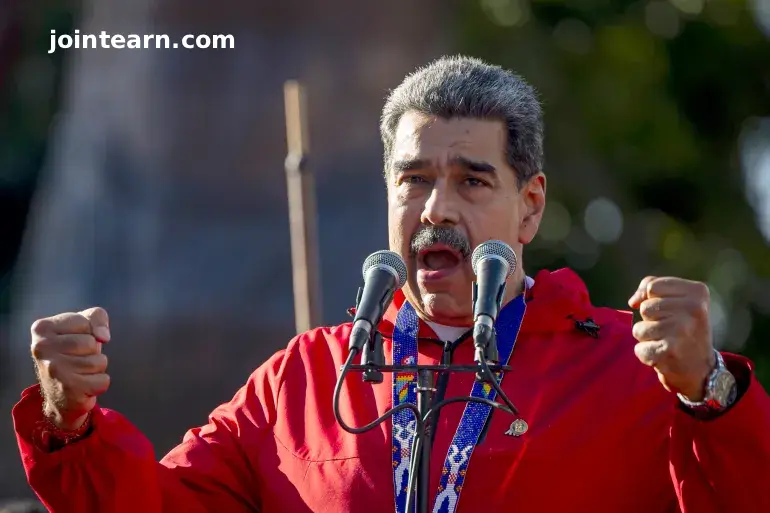
Caracas escalates military readiness as Washington increases naval presence in the Caribbean amid growing geopolitical confrontation.
Caracas — A Brewing Diplomatic and Military Showdown
Venezuelan President Nicolás Maduro has accused the United States of “fabricating a war” against his government, claiming Washington is preparing for military intervention under the pretext of combating drug trafficking. The statement came after the USS Gerald R. Ford, the world’s largest aircraft carrier, moved closer to Venezuelan territorial waters — an act Caracas says is part of a US-led campaign to destabilize the country.
“This is an extravagant and criminal fabrication,” Maduro said in a national broadcast on Friday evening. “They are inventing a false narrative to justify aggression against Venezuela. Our nation produces no cocaine — we are not a narco-state.”
The Trump administration, which has long accused Maduro of corruption and links to organized crime, recently claimed — without evidence — that the Venezuelan president leads the Tren de Aragua criminal network.
Venezuela Conducts Military Exercises Amid Rising Tension
In response to the heightened US military presence, Venezuelan Defence Minister Vladimir Padrino López announced that the country had launched large-scale coastal defense exercises.
“We are conducting military drills to defend our territorial sovereignty and to prepare for any covert operation that may be launched against Venezuela,” Padrino said on state television.
The drills reportedly involve troops deployed in nine coastal states, with footage showing Venezuelan militia members armed with Russian-made Igla-S anti-aircraft missiles.
According to Padrino, these exercises are designed to counter not only “large-scale threats” but also “drug trafficking, terrorist incursions, and clandestine sabotage operations.”
“CIA units operate in many parts of the world, and Venezuela is no exception,” he said. “But any attempt to violate our sovereignty will fail.”
US Military Operations in the Caribbean Intensify
Since early September, the US military has conducted at least 10 air and naval strikes against alleged drug-smuggling vessels in the Caribbean and Pacific Oceans, resulting in 43 deaths. Washington claims the operations are part of an intensified campaign to curb narcotics trafficking.
However, United Nations officials and international law experts have condemned the strikes, arguing that they violate international norms and constitute extrajudicial killings.
Meanwhile, the deployment of eight US Navy ships, 10 F-35 fighter jets, and a nuclear-powered submarine in the region has fueled fears of an imminent military escalation.
Maduro and his allies assert that the anti-drug operations are a cover for regime change, comparing them to previous US interventions in Latin America.
Political Fallout: Targeting the Opposition and Colombia
In the same broadcast, Maduro announced legal action to revoke the citizenship of opposition figure Leopoldo López, accusing him of “supporting foreign invasion.”
López, who has lived in exile in Spain since 2020, dismissed the move as unconstitutional, writing on X (formerly Twitter):
“No Venezuelan born in Venezuela can lose their nationality. Maduro is trying to silence those who support international efforts to restore democracy.”
López, once imprisoned for leading protests against Maduro’s government, has publicly supported US naval deployment in the Caribbean, calling it a “necessary measure” to dismantle Venezuela’s alleged drug networks.
At the same time, tensions between Washington and Colombia — once a key US ally — have also intensified. The US Treasury Department recently imposed sanctions on Colombian President Gustavo Petro, his family, and Interior Minister Armando Benedetti, accusing them of enabling drug cartels under Petro’s “Total Peace” initiative.
Petro fired back, calling the sanctions “a Republican vendetta led by Trump’s allies,” adding that Colombia “will not be intimidated by imperial bullying.”
Regional and Global Implications
The escalating standoff between Washington and Caracas could destabilize Latin America’s fragile geopolitical balance. Analysts warn that the US’s hardline approach risks provoking a wider regional conflict, potentially drawing in Russia, China, and Cuba — all key supporters of Maduro.
Maduro’s accusations also come as Venezuela struggles with economic collapse, hyperinflation, and mass emigration, with more than seven million Venezuelans having fled the country since 2015.
Observers say the Venezuelan leader may be using the external threat narrative to rally nationalist sentiment and consolidate domestic power, while Washington frames its actions as part of a broader anti-narcotics and anti-corruption campaign.


Leave a Reply